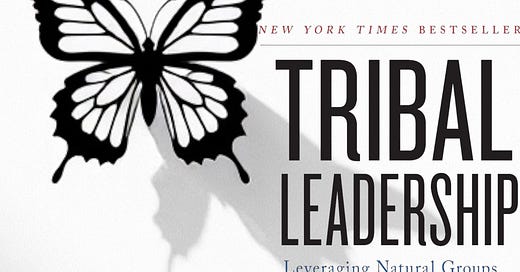Tribes, Not Titles as Social Capital
If Adam Smith were alive today, he might recognize in Tribal Leadership the living embodiment of his oft-overlooked insight: “There are evidently some principles in [man’s] nature, which interest him in the fortune of others …”
In an age of hyper-productivity and data-driven management, Tribal Leadership by Dave Logan, John King and Halee Fischer-Wright is not just a business book. It is a manifesto for a human-centered workplace renaissance, one that closely mirrors the ethos and vision of the Dave Alexander Center for Social Capital.
At its core, Tribal Leadership affirms what the Center has always believed: that social capital — the trust, loyalty and shared vision among people — is the most powerful currency in business today.
Whether in Silicon Valley, a rural health clinic or a scaling startup, the book shows that organizational culture is tribal at heart. But not just any tribe will do. Only those that evolve beyond ego and competition toward purpose, shared values and mutual uplift can achieve lasting excellence.
Through a decade-long study of more than 24,000 employees in two dozen organizations, the authors identify five distinct stages of tribal culture — ranging from despairing cynicism to near-enlightened purpose.
These aren’t abstract ideas. Rather, they’re field-tested realities that offer a tangible roadmap for both personal growth and organizational transformation.
Stage One: “Life Sucks” — the basement of disengagement, often marked by hostility and hopelessness.
Stage Two: “My Life Sucks” — the space of silent suffering, where self-pity quietly replaces rebellion.
Stage Three: “I’m Great (and You’re Not)” — the solo achiever era, filled with pride but lacking cohesion.
Stage Four: “We’re Great” — where real synergy begins to blossom as tribes gel around shared goals.
Stage Five: “Life Is Great” — a transcendent stage where work becomes art and tribes move with purpose, flow and mutual joy.
It is no accident that Stage Five feels spiritual in its flavor. It is the level at which “business” transcends metrics and becomes a vehicle for legacy. This is exactly where the Dave Alexander Center for Social Capital plants its flag.
The Center has long championed the idea that business leaders must see people not as means to an end, but as the end itself — a vision Tribal Leadership wholly supports. In fact, the book gives language and structure to what many visionary CEOs intuitively feel but struggle to articulate: that culture precedes results, and that leaders must first understand the tribal language and values of their people before steering them toward transformation.
Where this book truly aligns with the Center’s mission is in its insistence that the real product of any enterprise is human flourishing. Companies that reach Stage Five aren’t just efficient — they’re magnetic. Customers sense it. Communities rally around it. Employees don’t just stay; they evolve.
This belief resonates with the Center’s guiding principle that “those who lead with purpose will lead the future.” And in this, Tribal Leadership offers not only a lens for analysis but also a playbook for action. It doesn’t preach top-down mandates but, instead, honors the natural formation of tribes — small, tight-knit units of 20–150 people — and empowers leaders to steward these groups toward greatness with intention and empathy.
One of the book’s strongest contributions is its pragmatic “Tribal Leader’s Cheat Sheet,” which enables any leader to diagnose their culture and enact language shifts and value-aligned interventions to guide teams upward on the tribal scale. In other words, Tribal Leadership doesn’t just describe the terrain; it gives you the compass, the boots, and the trail map.
At a time when so many organizations are fraying at the seams — weighed down by burnout, disconnection, and shallow transactional leadership — the insights from Tribal Leadership are not just relevant. They’re urgent.
They echo the mission of the Dave Alexander Center, which believes that the future of capitalism depends not on how well we extract value from people, but on how well we create value with them. The leaders who understand this — who invest in culture as their core product — are the ones who will thrive in a world where the battle is no longer over resources, but over relationships.
In today’s climate of disruption and reinvention, this book invites us to ask: What tribal stage are we operating from? What stage are we building toward? And what kind of legacy do we want to leave behind as leaders?
In reading Tribal Leadership, you come away with more than strategies. You come away with a sense of hope — a renewed belief that greatness is not a solo climb but a communal summit. And in that belief lies the beating heart of Social Capital — the very soul of the Dave Alexander Center.





